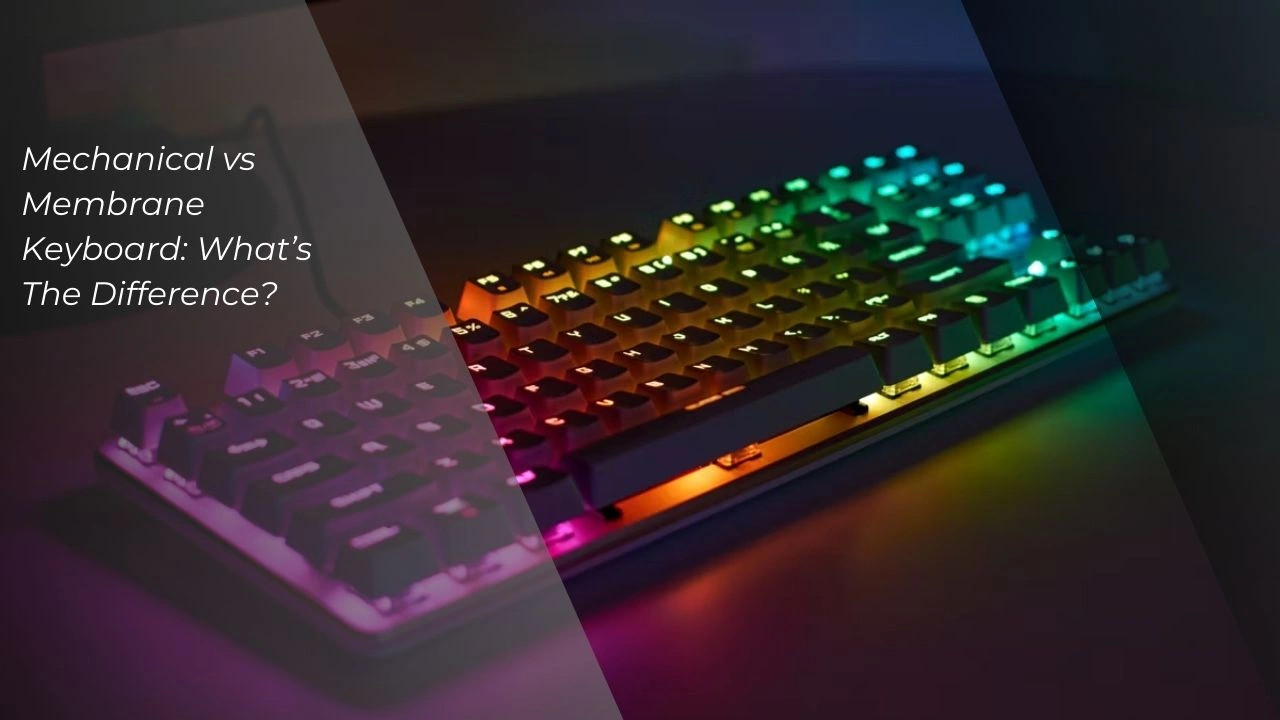Difference Between Mechanical and Membrane Keyboard – Considering a keyboard upgrade? Debating between a standard membrane keyboard and the trendy mechanical option?
This article explores the key difference between mechanical and membrane keyboard to help you decide if a mechanical keyboard’s higher price tag is justified.
While mechanical keyboards tend to be more expensive, they offer significant advantages over standard keyboards. Let’s delve into these distinctions to guide your informed buying decision.
Mechanical vs Membrane Keyboard

1. Mechanical Keyboard
Mechanical keyboards boast a superior typing experience thanks to individual mechanical switches beneath each key. These switches typically consist of a lever, spring, and metal contacts.
These switches also provide a satisfying tactile response, often with a bump or click, and enhance customization.
Mechanical keyboard works by pressing a key that triggers the lever to compress the spring, which then activates the metal contacts, sending a clear signal to your computer.
One more good thing about mechanical keyboards is that you can swap the switches and keycaps to personalize your keyboard, or add features to tailor it to your needs, such as noise reduction or improved keystroke comfort.
The results? Well, unlike standard keyboards that struggle with registering multiple key presses simultaneously, mechanical keyboards offer a superior responsiveness.
This makes the mechanical keyboards are popular among gamers, professionals, and frequent typist
2. Membrane Keyboard
Compared to mechanical keyboards with their individual switches, standard keyboards, often referred to as membrane keyboards, utilize a more basic design for registering keystrokes.
These keyboards rely on a two-part system: a rubber dome sits beneath each key, and a larger membrane sheet lies underneath the entire keyboard.
When you press a key, it pushes down on the corresponding rubber dome, which in turn makes contact with the membrane sheet.
This contact completes an electrical circuit, sending a signal to your computer that a specific key has been pressed.
Differences Between Mechanical and Membrane Keyboard

1. Switch Type
The core difference between mechanical and standard keyboards lies in their key switches.
Unlike standard keyboards that use a single sheet of membrane and rubber domes, mechanical keyboards rely on individual mechanical switches for each key.
These mechanical switches come in three main varieties: clicky, tactile, and linear. Each offers a distinct typing experience with varying levels of feedback and sound.
2. Key Travel Distance
Standard keyboards typically have a shallow key travel, meaning the keys don’t depress very far before registering a keystroke.
Mechanical keyboards, on the other hand, boast a significantly deeper travel distance. This increased depth allows the keys to sink in further before actuating, creating a more pronounced tactile response.
This satisfying feedback, often accompanied by a gentle bump or click depending on the switch type, is a hallmark of the mechanical keyboard experience for many users.

3. Typing Experience
People choose the mechanical keyboard due to their satisfying keystrokes.
Unlike the mushy feel of membrane keyboards, mechanical switches provide a delightful clicky or tactile bump with each press.
This distinct feedback lets your fingers know exactly what’s happening, making for a more accurate and enjoyable typing experience.
However, preference in typing feel is subjective. Some folks might gravitate towards the softer, quieter touch of membrane keyboards, especially in quieter environments.
Ultimately, the best keyboard is the one that feels most comfortable and allows you to type efficiently.
4. Durability
Mechanical keyboards outshine their standard counterparts in terms of durability. This advantage stems from their individual mechanical switches, built to withstand heavy use and resist wear and tear for years to come.
Moreover, mechanical keyboards offer unmatched customization. You can swap out the switches for a personalized typing experience or replace the keycaps to match your style, making them a keyboard built to last and adapt to your needs.
So there you go, the difference between mechanical and membrane keyboard if you’re looking for a new keyboard whether it is for a mere typing or gaming purposes.
But hold on, especially if you’re looking for a wireless keyboard, you have to be certain about one thing.
It is the DJID certification! Never heard of them? Well, DJID approval is a certification for a device that utilizes a radio frequency technology.
As in Indonesia, the use of radio frequency technology is strictly regulated, so you have to make sure that your keyboard is already DJID approved!

